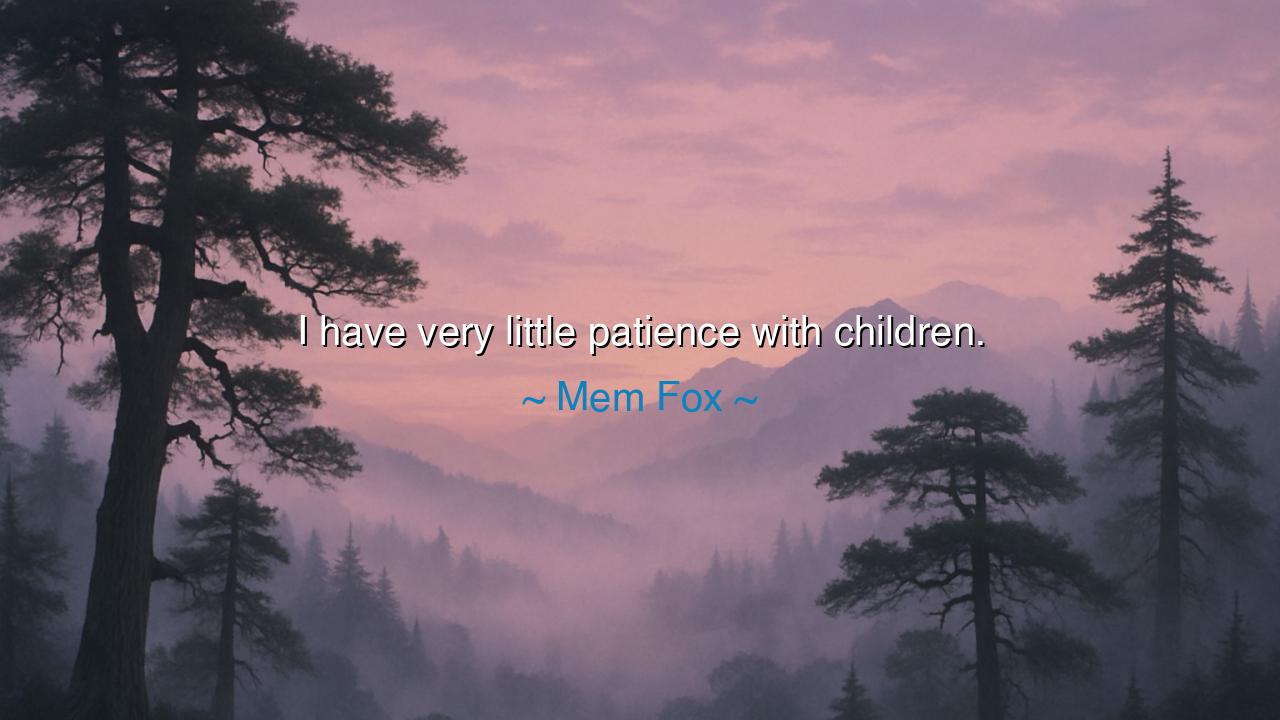
I have very little patience with children.






Mem Fox, beloved writer of children’s tales, once startled many by declaring with candor: “I have very little patience with children.” At first, these words may sound harsh, almost contradictory to her calling. How can one who has given so much to the realm of children’s literature confess such a sentiment? Yet within her honesty lies a profound truth about the human heart and the way art may serve those we cannot always endure directly. For Fox’s gift is not in endless patience, but in the crafting of stories that bridge the gulf between her spirit and the restless energies of the young.
The meaning of her declaration is not that she despises children, but that she recognizes her own limits. Children are demanding, unfiltered, insistent. They require attention without end, energy without exhaustion, and patience without boundaries. Few possess such qualities. But Fox, though she confesses a lack of patience, discovered another way to serve them: through the written word. By shaping tales of warmth and rhythm, she created a bond with children across the world, without needing to bear the constant strain of their presence. Her honesty is a reminder that service can take many forms.
History gives us echoes of this truth. Consider the philosopher Jean-Jacques Rousseau, who in his writings on education inspired generations, yet struggled in his personal dealings with family and children. Or the great Hans Christian Andersen, who penned fairy tales that touched the tender hearts of countless little ones, but who himself remained distant and often aloof in direct company. These figures remind us, as Fox does, that one may still serve and inspire without being naturally suited for the endless patience children often demand. The gift of storytelling, like the gift of teaching, may flourish even in those who cannot dwell constantly in the chaos of youth.
Her words also teach us to embrace truthfulness about our own limits. Too often, people hide their struggles behind masks, pretending to be what they are not. Fox’s confession is liberating—it tells us that it is acceptable to admit weakness, for in naming it, we may discover our unique path. Instead of forcing herself into the mold of the endlessly patient caregiver, she chose the role of author, crafting books that reach children in ways her personal temperament might not allow. Her art became her offering, and in that offering, she found both purpose and impact.
And yet, there is another layer of wisdom in her statement. Patience with children is not the sole measure of love. Love may take the form of patience, yes, but it may also take the form of creativity, of effort, of vision. A parent may lack calm, yet still provide devotion. An author may lack patience, yet still gift children with words that shape their souls for life. Fox reminds us that one need not embody every virtue to be of service. It is enough to know your strengths, confess your weaknesses, and build upon the ground that is truly yours.
The lesson for us is clear: do not despair if you lack some quality that the world praises. Instead, find where your true talents lie, and let them serve others. If you are not endlessly patient, perhaps you are deeply creative. If you are not a great speaker, perhaps you are a great listener. Each soul has its path, and to force it into another’s mold is to waste the gifts planted within. Like Fox, who turned her lack of patience into an impetus for creating timeless tales, we too can transform weakness into purpose.
Therefore, O seekers of wisdom, learn this: honesty about oneself is the first step to true service. Do not hide your limits, but acknowledge them with courage. Then ask: how can I, with the tools I do have, still serve others? For it is not perfection that changes the world, but sincerity. And in this, Mem Fox has shown us the way: that even one who confesses “I have very little patience with children” can become one of the greatest voices ever to speak to them.






AAdministratorAdministrator
Welcome, honored guests. Please leave a comment, we will respond soon